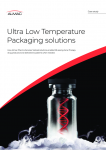Russians left in the dark despite lifted export ban
of Russia, the country's clinical research industry is still in the
dark on the new rules to control export of such materials.
"We don't have a clear situation and things are not back to normal," Yuri Pavlyuk, Russia's marketing and sales manager for global courier company TNT said in a phone interview. From what Outsourcing-Pharma.com has learned, the ban was formally lifted on 9th June and the Russian Health Ministry and the Federal Customs Service (FCS) agreed on a new set of rules to control the transportation of biological samples out of the country. Although the FCS did not release any official written announcement and only communicated information orally to logistics and transport providers, in theory exporting human tissue samples is permitted again, said Pavlyuk. "However, since then, the FCS has been unclear about the new rules and the information we receive changes everyday," he said. Pavlyuk explained that just a few days after the announcement from Customs that it had lifted the ban on the transportation of samples, TNT Russia decided to inform its clients, including contract research organizations (CROs), as well as other TNT offices of the good news. "But on that same day, on 13th June, we received more verbal information from the FCS that exports were indeed permitted but under new conditions, and in particular with additional paperwork requirements." The new procedure is mostly the same as before with the only difference that the approval must be signed by one of four persons from the current Roszdravnadzor (The Federal Agency for Health Care and Social Development), Igor Stefanov, spokesperson for Synergy Research Group (SynRG), a Russian CRO, told Outsourcing-Pharma.com. "The problem is that most of them were assigned to their positions (including the head of the agency) only early this year, which means that about 90 per cent - or 3,000 - of the current approvals, need to be reauthorised, so this will take a while." Nevertheless, he explained, a number of customs authorities accept approvals with old signatures at their own risk. According to Pavlyuk, an existing member of the Roszdravnadzor has been added to the four people whose signature is also required to apply for a sample export, although it does not solve the problem entirely as he did no sign all the old permissions. Russian media reports said that the Health Ministry confirmed that new rules on transportation abroad of biological human samples had been agreed and that permissions will continue to be issued by Roszdravnadzor medical watchdog. But the whole episode can only have been harmful for the country because most of thethe specimens collected from trials in Russia need to be analysed outside the country in a time-sensitive manner by laboratories that have the required equipment and expertise - nearly 800 transportations of such biological specimens were conducted last year. However, Customs spokesman Alexander Smelyakov told Russian news agency ITAR-TASS that none of the patients, who sent their tissue samples abroad for analysis, had suffered because of the temporary ban. Outsourcing-Pharma.com made several attempts to contact the Federal Customs Service who failed to comment on the issue. However from the point of view of logistics providers and CROs, it is a different story. Pavlyuk said that TNT Russia sends on average 170 samples every day, of which 10 per cent are frozen and the remainder kept at ambient temperature - a figure that has been reduced to almost zero from 28 May until yesterday, although he could not comment on the financial impact on the company as all the contracts are dealt with by TNT's head office. "Every day of delay in launching a product costs a sponsor about $1m (750,000). In addition, every overseas shipment from Russia costs about 150 and some CROs can send up to 100 parcels a week," added Stefanov, from SynRG. Although SynRG was not impacted directly by the ban since all the company's current clinical trials use local laboratories, Stefanov explained. "As a matter of fact we always recommend a sponsor to use the local laboratory since we have a number of certified laboratories in this country," said Stefanov. "Firstly, this saves money and secondly it avoids pitfalls like this." Pavlyuk from TNT was quite optimistic and said he expected this temporary situation to end soon. "The issue will probably be resolved in about a week when both government and Customs agree on a definite set of rules for the transporation process of biological samples," he said.

















